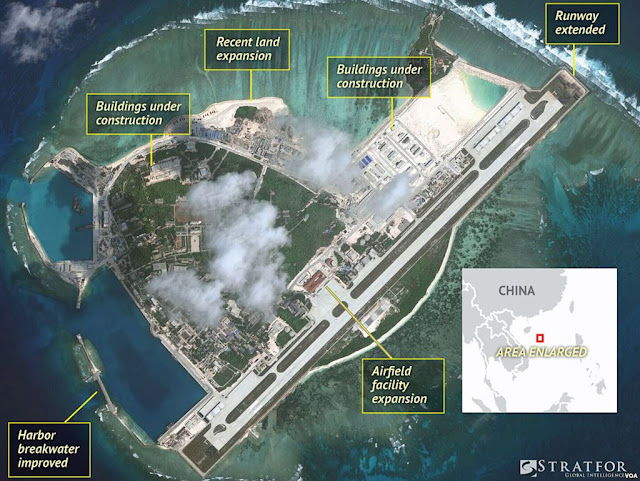Will Beijing's South China Sea 'Land Creation' Lose it the Peace? ( Source- The National Interest / Author- James Goldrick)
 |
| Image credits- VOA |
Source- The National Interest
Author- James Goldrick
China's leadership faces difficult decisions in the South China Sea. China is at some risk of achieving what it sees as a military success at the price of losing the peace.
There is increasing evidence that its land creation (for they are not 'reclamation') activities in the South China Sea are developing a network of bases that will support fixed sensors, such as radars and underwater arrays, as well as the operations of air and seaborne surveillance units. The cumulative effect intended by Chinese planners appears to be to make it too dangerous during a conflict for other nations, most notably the US, to conduct significant military operations in the area, whether on, under or over the South China Sea; and certainly to make sure that none will go undetected in peacetime.
China's goal is to be able to regard the sea areas south of Hainan Island as a safe haven for its naval forces,particularly its submarines, as well as a jumping off point for more distant operations.
This is not a welcome development for the Americans, who have labeled the artificial islands, with some accuracy, as being a 'Great Wall of Sand'. The number and size of the installations is also a concern for the other claimants to the South China Sea and an unwelcome confirmation of China's increasingly powerful maritime capabilities. But the islands themselves do not represent the core of the problem, which China has created for itself, by folding its military intent into a narrative of China's historic claims to the sea areas and an ambiguous assertions of 'sovereign rights'.
However unwelcome, the new creations, considered as artificial installations, represent a fait accompli with which other nations can live with (and will have to live with). The Americans will take account of their capabilities in formulating their own operational concepts, just as they do for other 'anti-access' strategies and technologies. Notably, in a high intensity conflict, such 'unsinkable (but also immovable) aircraft carriers', located as they are in known positions so far from the Chinese mainland, would be high on any targeting list and very vulnerable.
What matters much more is what China's other actions now, and in the future, mean for its long-term relationship with maritime Southeast Asia. The development of yet another artificial island on Scarborough Reef and the declaration of an Air Defense Identification Zone over the South China Sea by China would certainly raise further tensions.
The real danger, however, is that China will take its notion of 'sovereign rights' over the South China Sea too far and that Chinese paramilitary forces will be employed to eject fishing vessels and other units of the littoral nations, probably starting with the Philippines. This may happen as an emotional response to an unfavorable finding in the Philippines case by the Permanent Court of Arbitration, but it could also be driven by the progressive collapse of the South China Sea's fish stocks. Chinese fishing interests are well aware that their catches are diminishing. The Hainan provincial government has admitted that it has provided substantial subsidies to its fishermen to allow them to operate further afield and for more extended periods. Both regional and central governments are likely to come under considerable pressure to do even more for their fishermen and this may extend to direct action against their competitors.
If China ejects other nations from the area, Beijing will indeed be at risk of losing the peace. Contrary to suggestions that its dominion over the South China Sea would be accepted as a fait accompli, the reverse will be the case. It will not be forgotten and it will not go away. The other claimant nations will be forced to live with a boundary that cuts them off from their own historic areas of activity — a boundary that is barely out of sight of their own coasts. Resentment can only fester, both at a local level in the various nations' coastal communities, and at the national level in countries which are particularly sensitive to any perceived infringements of their national sovereignty.
As a country that seeks to be a leader in both the region and around the globe, China would do well to consider this slowly ticking time bomb. It is true that the Chinese leadership have to manage the nationalist views of their own population. These views may be a dragon largely of their own creation, but are no less real because of that. Nevertheless, it is time for China to finesse its policies for the South China Sea with a sensitivity that has so far been absent from much that it has done. In the end, the South China Sea must remain what it always has been, a shared space.
This piece first appeared in The Lowy Interpreter here.
Original link to the article- http://www.nationalinterest.org/blog/the-buzz/will-beijings-south-china-sea-land-creation-lose-it-the-15953
Comments